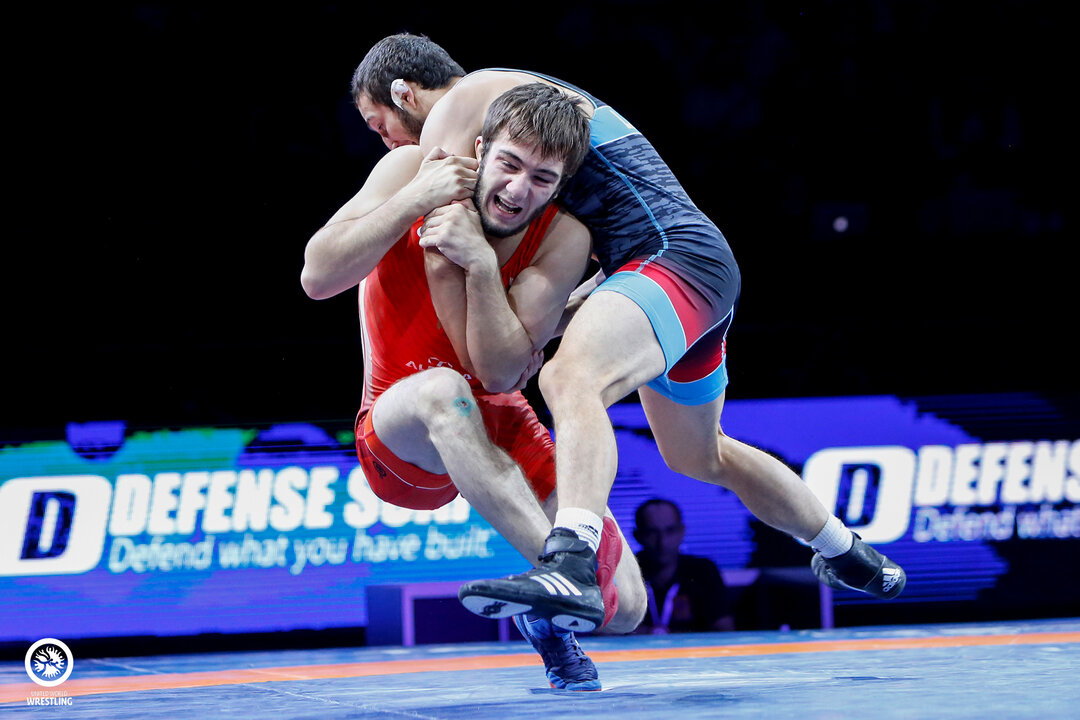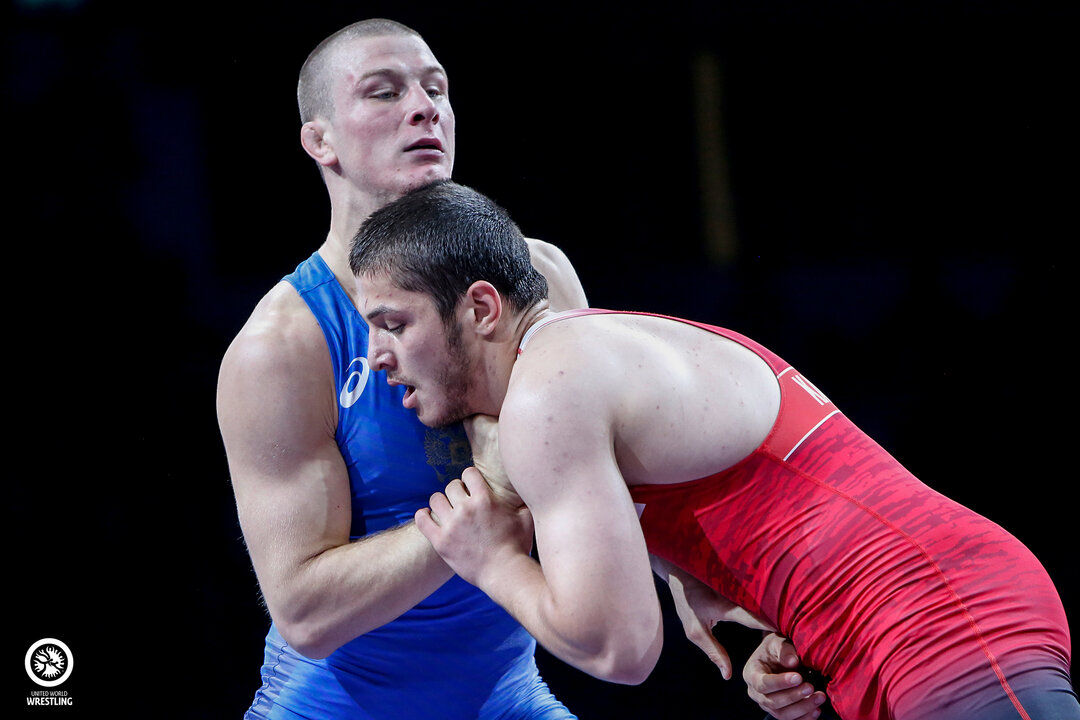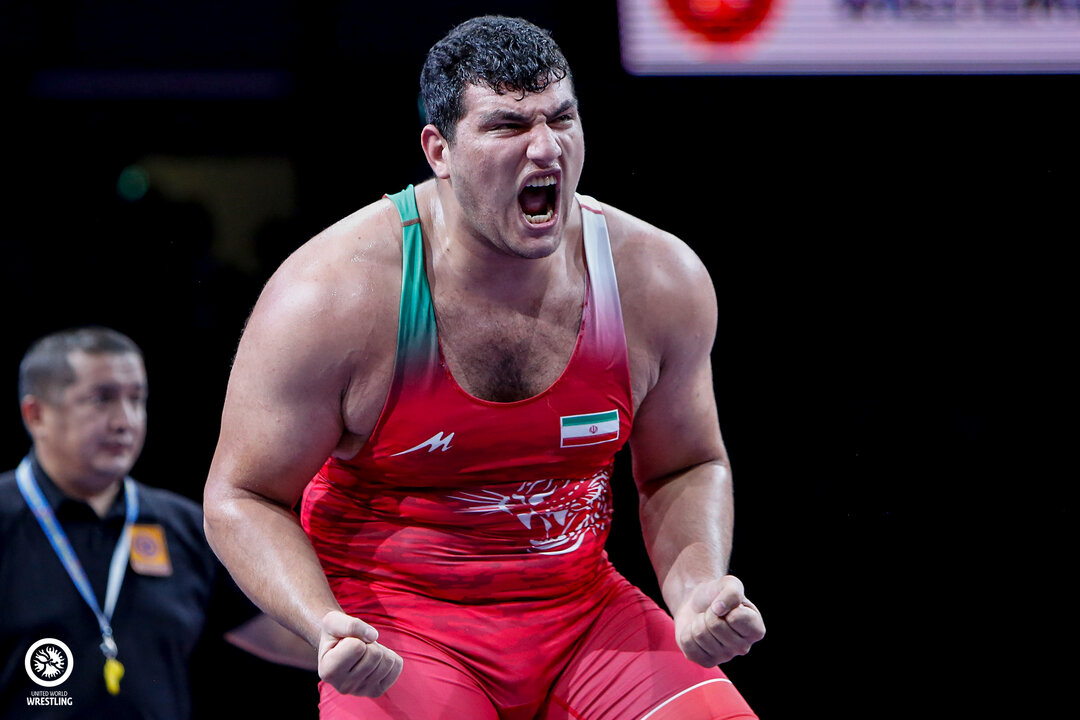Russia Wins Three Golds on Saturday Night, Leads Iran By Seven Points
Saturday, August 17, 2019 - 19:22 By Eric Olanowski

TALLINN, Estonia (August 17) – The Russian Federation (97 points) won a trio of Day 6 junior world titles and have a seven-point lead over second-place Iran (90 points), who had two wrestlers reach the top of the podium on Saturday.
Anvar ALLAKHIAROV (RUS) ascended to the top of the podium with a fall over Zaur ALIYEV (AZE) after erasing a 4-0 deficit in the 55kg finals. “I feel very good. Everything came out perfect and that’s what I wanted to do,” said Allakhiarov after winning his first world title.
In the opening period, Allakhiarov gave up a four-point throw, but scored a reversal -- cutting the Azeri’s lead to three points with a quick reversal. A pair of back-to-back gut wrenches flipped the match in favor of Allakhiarov, as he took the 5-4 lead into the break.
In the second period, the Russian back-peddled as the Aliyev heavily pressed the pace. While toeing the out of bounds line, Allakhiarov circled to his left and tried to get back to the center of the mat to avoid giving up the step-out point. His Azeri opponent also started to circle back towards the center of the mat, but while doing so, relaxed for one second. Allakhairov capitalized on that one-second opening and threw a massive headlock and planted Aliyev flat on his back for the fall to claim his first world title.
“I feel very happy to be the first Russian in Greco-Roman to win the world title” Allakhairov said. He added, “We put a lot of work into the preparation process so we’re very happy with everyone in the finals.”
 Abu AMAEV (RUS) defeated Leri ABULADZE (GEO), 5-3 in the 63kg finals -- handing Russia their second gold medal of the night. (Photo: Gabor Martin)
Abu AMAEV (RUS) defeated Leri ABULADZE (GEO), 5-3 in the 63kg finals -- handing Russia their second gold medal of the night. (Photo: Gabor Martin)
Russia’s second champion came at 63kg where Abu AMAEV (RUS) scored the tactical 5-3 win over Leri ABULADZE (GEO) in the gold-medal match. “The hardest part of the competition was the finals. The opponent I wrestled in the finals was second in Europe, so I’m very happy to be the world champion.”
After the match, Amaev took a deep breath and let out a noticeable psy of relief. When asked why he let out such a deep breath, Amaev said, “I felt the happiest when my hand was raised, and I knew I was world champion.”
The newly minted world champion, who said he has hopes of making an Olympic team one day, will head back to Chechnya, Russia, and take a week off before getting back to training. “I don’t know what’s next. I think I will take a week off…I’m going to train and see what the future brings.”
 Ilia ERMOLENKO (RUS) was the third Russian to win a gold medal on Day 6. He snuck past Giorgi KATSANASHVILI (GEO), 2-0 in the 87kg finals (Photo: Gabor Martin)
Ilia ERMOLENKO (RUS) was the third Russian to win a gold medal on Day 6. He snuck past Giorgi KATSANASHVILI (GEO), 2-0 in the 87kg finals (Photo: Gabor Martin)
A bloody and battered Ilia ERMOLENKO (RUS) scored a point in each period against Giorgi KATSANASHVILI (GEO) in the 87kg finals and became the third Russian wrestler to circle the mat with his nation’s flag over his head. “All of my matches were very hard, but the hardest one was definitely the finals,” said Ermolenko after winning his gold medal. He continued, saying, “I’m very happy to be a world champion. I’ve worked very hard to get to this point and I would like to thank everyone who has supported me.”
 Aliakbar YOUSOFIAHMADCHALI took down 2018 cadet world champion Cohlton Michael SCHULTZ (USA), 2-1 in the 130kg finals. (Photo: Gabor Martin)
Aliakbar YOUSOFIAHMADCHALI took down 2018 cadet world champion Cohlton Michael SCHULTZ (USA), 2-1 in the 130kg finals. (Photo: Gabor Martin)
Meanwhile, Iran’s Mohammad NAGHOUSI and Aliakbar YOUSOFIAHMADCHALI snuck past their gold-medal final opponents, 2-1, and helped their country head into the final day of wrestling at the 2019 Junior World Championships only trailing Russia by seven points.
In the 77kg finals, Mohammad Naghousi nabbed the one-point win over Damir RAKHIMOV (RUS), while Aliakbar Yousofiahmadchali stole the 130kg gold medal from 2017 cadet world champion Cohlton Michael SCHULTZ (USA).
The final day of wrestling begins tomorrow at 16:00 (local time) and can be followed live on www.unitedworldwrestling.org.
Team Scores (After Day 6)
GOLD - Russia (97 points)
SILVER - Iran (90 points)
BRONZE - Georgia (56 points)
Fourth - Turkey (42 points)
Fifth - United States (41 points)
55kg
GOLD - Anvar ALLAKHIAROV (RUS) df. Zaur ALIYEV (AZE), 9-4
BRONZE - Ken MATSUI (JPN) df. Nurmukhammet ABDULLAEV (KGZ), 13-12
BRONZE - Poya Soulat DAD MARZ (IRI) df. Tigran MINASYAN (ARM), 2-0
63kg
GOLD - Abu AMAEV (RUS) df. Leri ABULADZE (GEO), 5-3
BRONZE - Shahin Eidi BADAGHI MOFRAD (IRI) df. Nikalas Petrov SULEV (BUL), 3-2
BRONZE - Alston Jon NUTTER (USA) df. Kamil CZARNECKI (POL), via fall
77kg
GOLD - Mohammad NAGHOUSI (IRI) df. Damir RAKHIMOV (RUS), 2-1
BRONZE - Dmytro VASETSKYI (UKR) df. Exauce MUKUBU (NOR) , 3-2
BRONZE - Sajan SAJAN (IND) df. Abdurrahman KALKAN (TUR), 11-1
87kg
GOLD - Ilia ERMOLENKO (RUS) df. Giorgi KATSANASHVILI (GEO), 2-0
BRONZE - Bedirhan TAN (TUR) df. Jacob Edward LOGAARD (SWE), 3-0
BRONZE - Ihar YARASHEVICH (BLR) df. Hasan FOROUZANDEH GHOJEHBEIGLOU (IRI), 4-4
130kg
GOLD - Aliakbar YOUSOFIAHMADCHALI (IRI) df. Cohlton Michael SCHULTZ (USA), 2-1
BRONZE - Dariusz VITEK (HUN) df. Lu ZHANG (CHN), 3-2
BRONZE - Muhammet Hamza BAKIR (TUR) df. Robinzon ESADZE (GEO), 5-1


 Women's Wrestling at the 2004 Athens Olympic Games. (Photo: United World Wrestling / Martin Gabor)
Women's Wrestling at the 2004 Athens Olympic Games. (Photo: United World Wrestling / Martin Gabor) Tayla FORD (NZL) is the first wrestler from New Zealand who will compete at the Olympics. (Photo: United World Wrestling / Amirreza Aliasgari)
Tayla FORD (NZL) is the first wrestler from New Zealand who will compete at the Olympics. (Photo: United World Wrestling / Amirreza Aliasgari)
Share your thoughts.
Comments